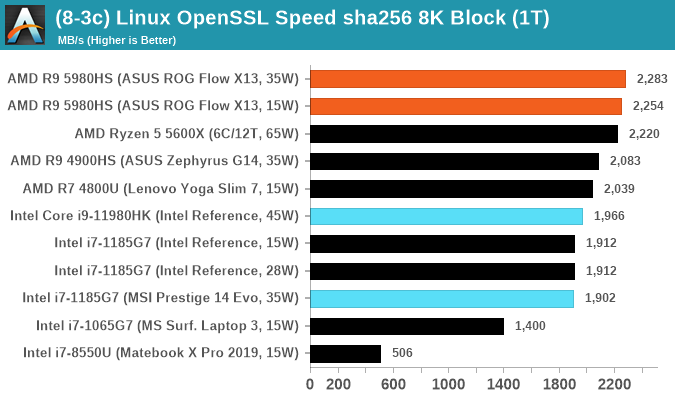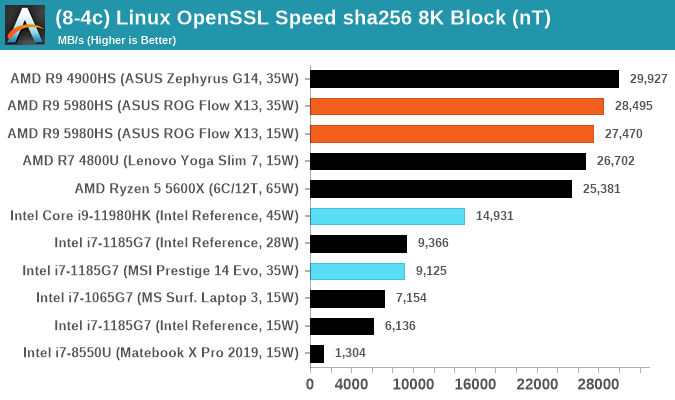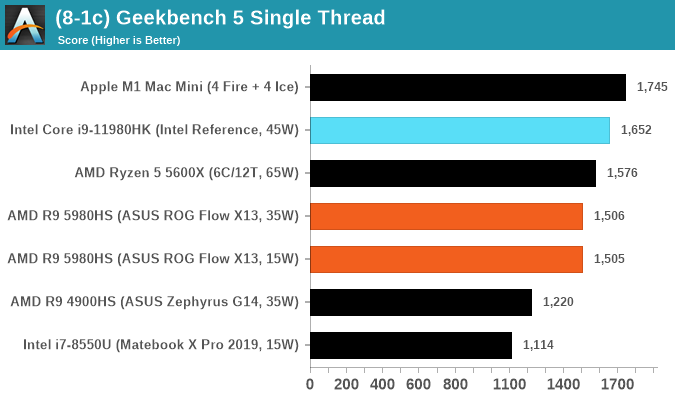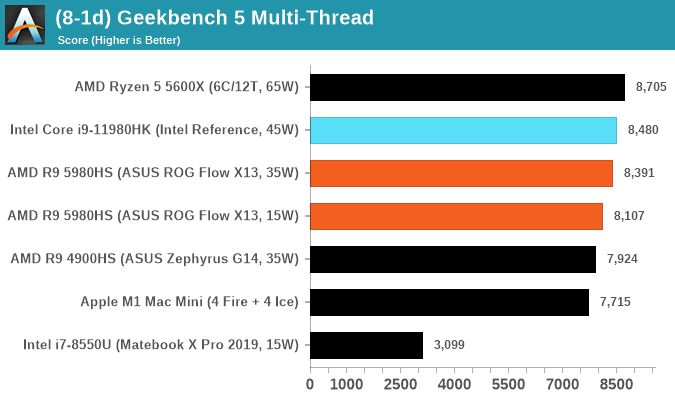Intel 11th Generation Core Tiger Lake-H Performance Review: Fast and Power Hungry
by Brett Howse & Andrei Frumusanu on May 17, 2021 9:00 AM EST- Posted in
- CPUs
- Intel
- 10nm
- Willow Cove
- SuperFin
- 11th Gen
- Tiger Lake-H
CPU Tests: Synthetic
Most of the people in our industry have a love/hate relationship when it comes to synthetic tests. On the one hand, they’re often good for quick summaries of performance and are easy to use, but most of the time the tests aren’t related to any real software. Synthetic tests are often very good at burrowing down to a specific set of instructions and maximizing the performance out of those. Due to requests from a number of our readers, we have the following synthetic tests.
Linux OpenSSL Speed: SHA256
One of our readers reached out in early 2020 and stated that he was interested in looking at OpenSSL hashing rates in Linux. Luckily OpenSSL in Linux has a function called ‘speed’ that allows the user to determine how fast the system is for any given hashing algorithm, as well as signing and verifying messages.
OpenSSL offers a lot of algorithms to choose from, and based on a quick Twitter poll, we narrowed it down to the following:
- rsa2048 sign and rsa2048 verify
- sha256 at 8K block size
- md5 at 8K block size
For each of these tests, we run them in single thread and multithreaded mode. All the graphs are in our benchmark database, Bench, and we use the sha256 results in published reviews.


GeekBench 5: Link
As a common tool for cross-platform testing between mobile, PC, and Mac, GeekBench is an ultimate exercise in synthetic testing across a range of algorithms looking for peak throughput. Tests include encryption, compression, fast Fourier transform, memory operations, n-body physics, matrix operations, histogram manipulation, and HTML parsing.
Unfortunately we are not going to include the Intel GB5 results in this review, although you can find them inside our benchmark database. The reason behind this is down to AVX512 acceleration of GB5's AES test - this causes a substantial performance difference in single threaded workloads that thus sub-test completely skews any of Intel's results to the point of literal absurdity. AES is not that important of a real-world workload, so the fact that it obscures the rest of GB5's subtests makes overall score comparisons to Intel CPUs with AVX512 installed irrelevant to draw any conclusions. This is also important for future comparisons of Intel CPUs, such as Rocket Lake, which will have AVX512 installed. Users should ask to see the sub-test scores, or a version of GB5 where the AES test is removed.


To clarify the point on AES. The Core i9-10900K scores 1878 in the AES test, while 1185G7 scores 4149. While we're not necessarily against the use of accelerators especially given that the future is going to be based on how many and how efficient these accelerators work (we can argue whether AVX-512 is efficient compared to dedicated silicon), the issue stems from a combi-test like GeekBench in which it condenses several different (around 20) tests into a single number from which conclusions are meant to be drawn. If one test gets accelerated enough to skew the end result, then rather than being a representation of a set of tests, that one single test becomes the conclusion at the behest of the others, and it's at that point the test should be removed and put on its own. GeekBench 4 had memory tests that were removed for Geekbench 5 for similar reasons, and should there be a sixth GeekBench iteraction, our recommendation is that the cryptography is removed for similar reasons. There are 100s of cryptography algorithms to optimize for, but in the event where a popular tests focuses on a single algorithm, that then becomes an optimization target and becomes meaningless when the broader ecosystem overwhelmingly uses other cryptography algorithms.










229 Comments
View All Comments
Andrei Frumusanu - Monday, May 17, 2021 - link
As a note, we're just finishing up this review at the very last minute due to us getting our hands on the reference laptop only in the last 48h. I'll be completing the missing page texts in the next few hours as we're tidying up the article.EliteRetard - Monday, May 17, 2021 - link
Did you have a description/specs of the test systems?If it was there I missed it, even after going back to look.
Differences in RAM / storage etc. can affect some tests.
I'm guessing the size based on the name of the Asus...
Looks like you're comparing a 16" workstation vs a 13" thin/light?
Would the AMD CPU perform better in a larger/cooler chassis?
timecop1818 - Tuesday, May 18, 2021 - link
> Would the AMD CPU perform betterlol
Spunjji - Tuesday, May 18, 2021 - link
> timecop1818lol
Qasar - Tuesday, May 18, 2021 - link
gotta love timecrap181...at_clucks - Wednesday, May 19, 2021 - link
Come on, the Intel CPU actually performs decently... for a slowish desktop CPU stuck in a laptop chassis. Still not that bad.Spunjji - Thursday, May 20, 2021 - link
It performs very well, but timcarp1488 was completely misreading what had actually been said just to shitpost his usual anti-AMD nonsense.Spunjji - Tuesday, May 18, 2021 - link
"Did you have a description/specs of the test systems?"A brief description of the Intel reference system is in this review, more detail of the AMD system is available in the review these test results came from.
"Would the AMD CPU perform better in a larger/cooler chassis?"
A 45W variant of the AMD CPU in a larger chassis would see higher sustained multi-core performance, but single-core is probably quite similar.
Gondalf - Wednesday, May 19, 2021 - link
Strange article Andrei.5980HS is rated 35-54 W or 45W+. How can you judge that 45W Intel is less efficient?? Have you data about TDP settings of Asus X13 ? Likely the AMD SKU run at the highest TDP for more performance on Asus device, for several minutes or continuously.
Bet you neeed to be more informed in your articles, OEMs can go at the max TDP of a cpu since the Tskin of the laptop allow this.
Bet Intel Tiger Lake H will be faster than in your article on the right chassis ?
Bet direct power measures are better than generic comments ?
Retycint - Thursday, May 20, 2021 - link
Strange comment Gondalf.The graph of the 5980HS on page 2 shows that the Asus X13 runs at 42W for about 300s and then drops to 35W for the rest of the time.
Bet you didn't read the article and just came down instantly to try and feel smug?
Bet you need to be more informed when making hate posts?